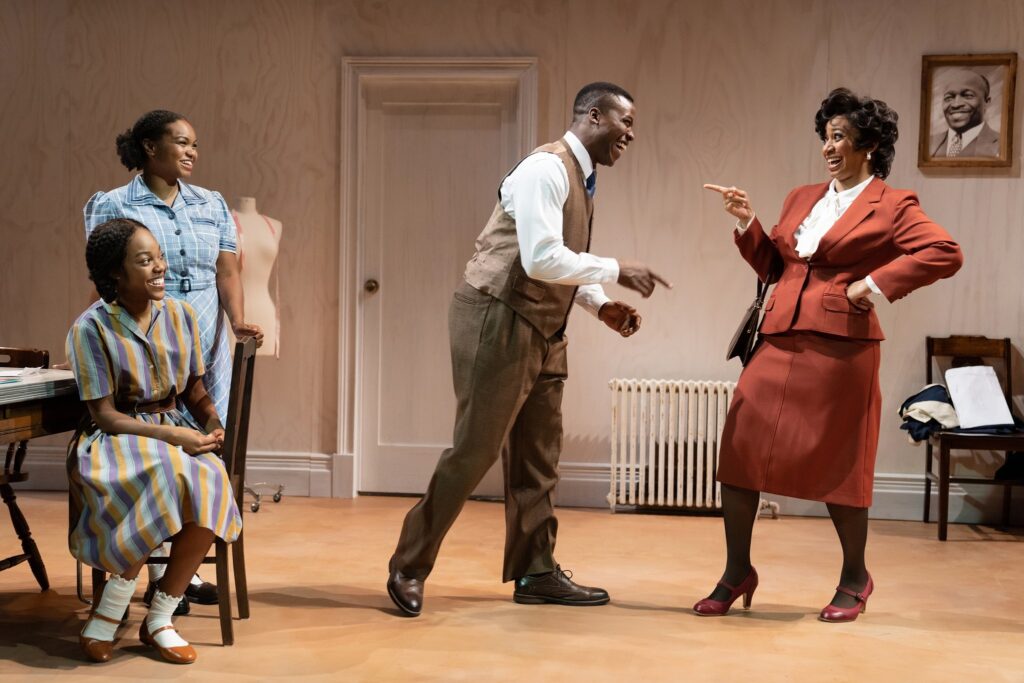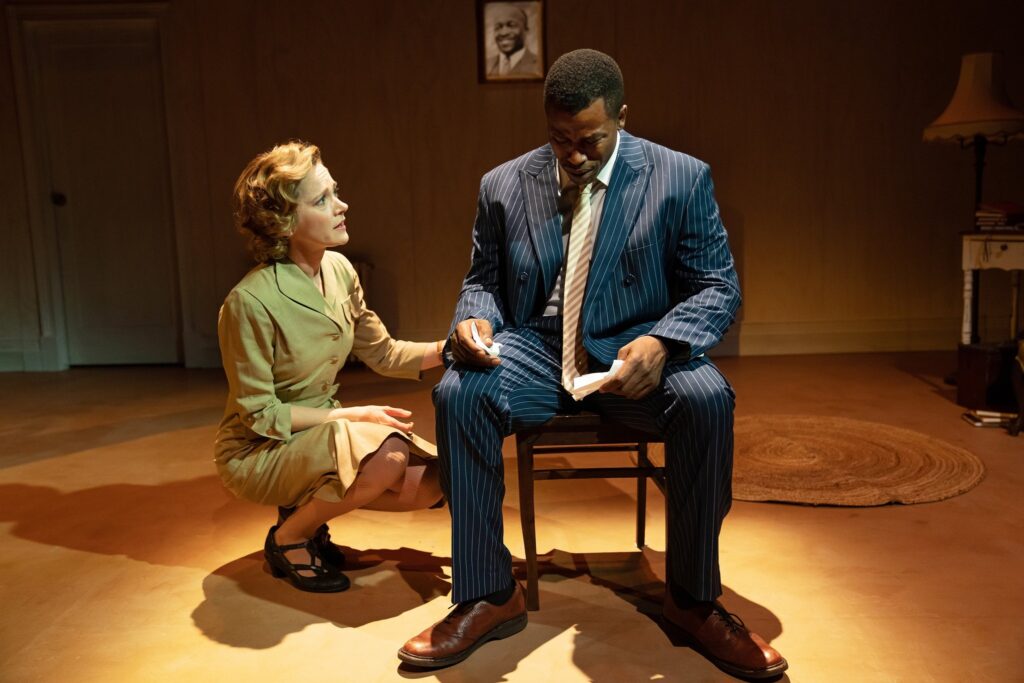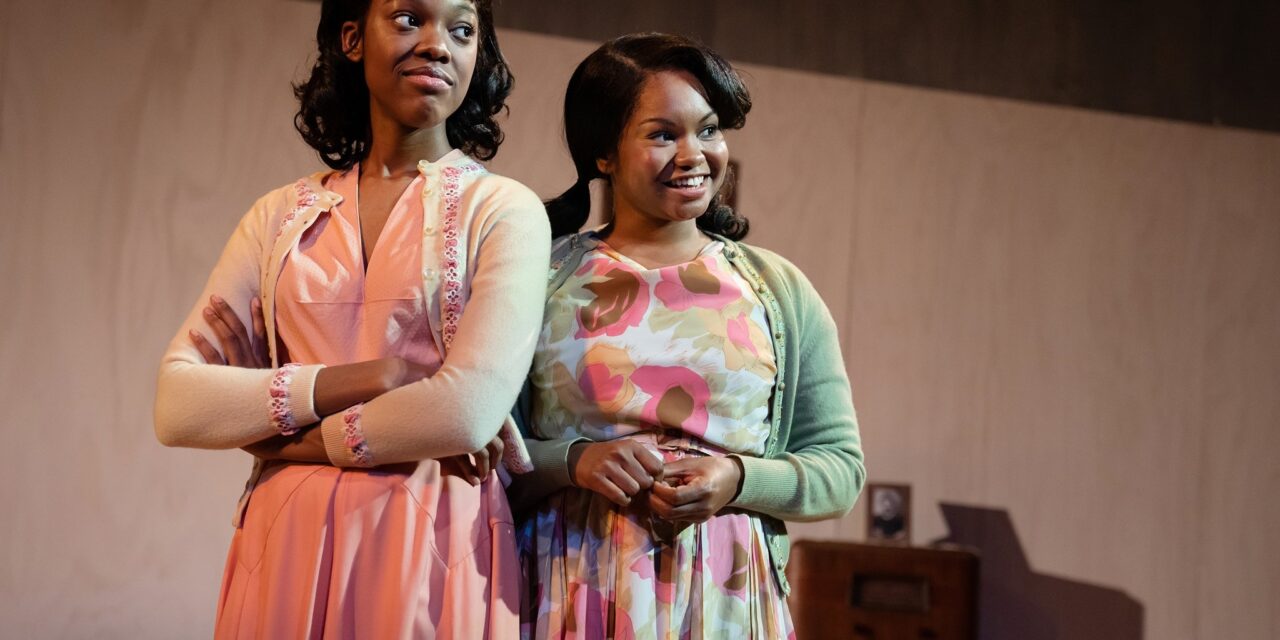By Stuart Miller . . .
When Ernestine, a bookish and dreamy 17-year-old, tells the audience in her opening monologue that her shattered family’s new home in Brooklyn is “a basement apartment, kind of romantic, like a Parisian artist’s flat,” her sassier, streetwise sister, Ermina, breaks in without compunction: “If Parisian means ugly.”
It’s a small moment and a light one, but it sets the scene for all that follows in Crumbs from the Table of Joy, a delightful and moving revival of Lynn Nottage’s first professional play from the Keen Company. Crumbs may not match Nottage’s Pulitzer Prize winners, Ruined and Sweat, in terms of scope, and Ermina is underwritten in the second act but those opening moments are followed by plenty more moments filled with humor and pathos all expertly delivered.
The chemistry between Shanel Bailey as the introverted Ernie, and Malika Samuel as the full-steam-ahead Ermina, is a definite highlight and Bailey sometimes seems she can carry the entire play just with her expressive eyes, but the whole cast is strong under the direction of Colette Robert.
Ernie and Ermina have been dragged north from Jim Crow Florida—this is 1950—by their father Godfrey in the wake of his beloved wife’s death; but he didn’t come to find opportunity in the North, he came seeking spiritual guidance from a messianic huckster named Father Divine. He chose Brooklyn because that was, Ernie dryly notes, “the return address on a miracle elixir boasting to induce ‘peace of mind.’” Divine, naturally, was based elsewhere.

Godfrey (Jason Bowen) is loving but overly strict and demanding, and is constantly seeking answers from Father Divine but often cannot see the truths that lay in front of him. The household grows with the arrival of his wife’s sister Lily.
She’s a well-dressed and sensual woman who says she promised her mother she’d provide a woman’s touch for her dead sister’s girls . . . but she seems just as interested in offering that touch to Godfrey. Lily claims to be a Communist revolutionary and dispenses wisdom to the girls, but a drink and a dance matter more than the hard work of fomenting change. Martin’s Lily is smart and worldly and fun and sexy . . . yet sad and increasingly desperate for someone or something to latch onto.
Tension in the apartment between Godfrey and Ernie, and between Godfrey and Lily, ratchets up later with the arrival of Gerte (Natalia Payne), who is not only a stranger, but a white woman . . . and a German to boot.
In Ernie’s coming-of-age tale, Nottage’s adult characters are all sufficiently complex that we empathize with each, despite their plethora of flaws. Godfrey does want the best for his girls even if he can’t quite see what they need, blinded by his devotion to Father Divine; Lily brims with ideas and affection, even as she spins her wheels with a touch of bitterness in this Brooklyn apartment, a sharp fall from the life she seems to have led in Harlem. Gerte obviously brings plenty of baggage, mentioning how much she and her fellow Germans suffered after the war (without getting into the details of, you know, what they were all doing during the war.)


Lest that all sound too heavy, there are light moments, although when they seem too good to be true—like when Lily and Gerte drop their guard and dance together beautifully—they usually are revealed as fantasies from the imagination of the movie-obsessed Ernestine.
Throughout, the dialogue is crisp and lively. When Gerte first arrives in the girls’ lives, Ermina exclaims, in shock, “She white,” because of her father’s everlasting distaste for and distrust of white people. When Godfrey, pleading for peace and decorum, asks, “Well, should we all sit,” Ermina snaps with perfect adolescent snottiness, “Why? She won’t be white if we sit down?”
And while Gerte is tentative and exceedingly polite, Ernie reacts by turning to the audience: “Oh god, did she have to be a German lady? If he had to have a white light, why not a French lady, or an English lady like Olivia de Haviland with her modest downward glance. But there she is like Marlene Dietrich, a cold, bitter whore laughing in our doorway. She might as well be wearing a tuxedo and blowing smoke in our faces.”
This struggling family may have to scrounge for their crumbs of joy, but Nottage makes sure the audience leaves the theater fully nourished.
Crumbs from the Table of Joy. Through April 1 at Theater Row (410 West 42nd Street, between Ninth and Tenth Avenues). Two hours, with one intermission.
Photos: Julieta Cervantes


















